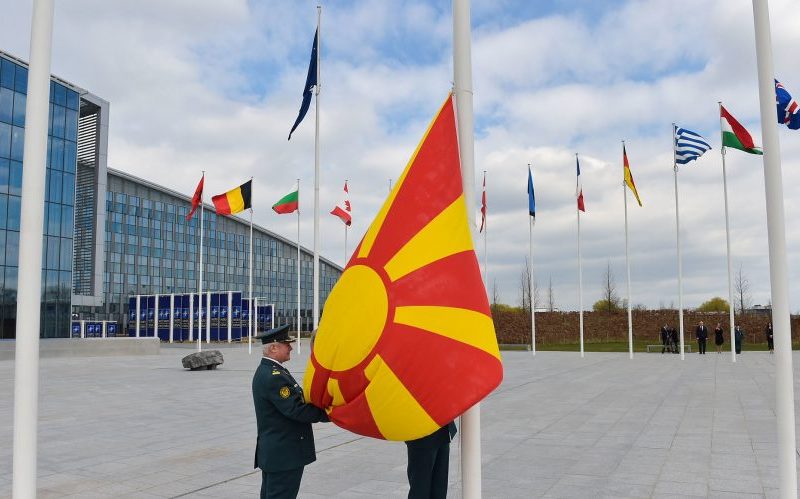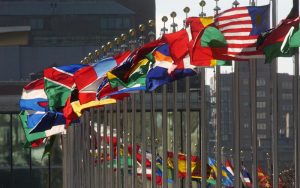This year we mark 18 years since the Republic of North Macedonia received the status of a candidate country for EU accession. Hence, the children born on the historical day when North Macedonia became an official EU candidate are coming of age this year and are on the doorstep of the student campuses. It remains to be seen whether a new disappointment is on the horizon for North Macedonia, even after the new constitutional changes in favor of the neighbors.
“Clean hand” Independence
The Republic of North Macedonia (previously the Republic of Macedonia / Former Yugoslav Republic of Macedonia) is one of the six republics of the former Yugoslavia and the only country that in the face of the Yugoslav war gained its independence peacefully. After the declaration of independence, the political fellowship led by President Kiro Gligorov started a wise policy to return all Macedonian soldiers from the Yugoslav National Army that found themselves in the crossfire between the other Yugoslav republics in the fraternal war.
The lack of political culture in the population, the dead civil sector, the high rate of unemployment, the process of privatization of the state property, and the soft approach to the international community were just some of the many problems that the new and young democracy was facing. In the first years of independence, the political elite was focused on finding international partners that will help her with the Euro-Atlantic accession processes, clearly ignoring the domestic problems.
Although it seemed that Macedonia managed to build a positive image in the international community as a safe country that stayed immune to the impact of the Yugoslav wars, the conflict in 2001 significantly damaged its reputation.
In addition to the obstacles from the neighboring countries related to the Euro-Atlantic accession, the government of North Macedonia acted too passively in relation to the EU’s recommendations regarding the fight against corruption, institutional dysfunction, as well as the rule of law.
Becoming an EU Partner
On January 15, 1992, the European Union established an Arbitration Commission, headed by the President of the Constitutional Court in France, Robert Badinter. The Commission concluded that North Macedonia meets all the conditions for international recognition and that the name does not represent a territorial threat to neighboring countries. In 1997, North Macedonia and the EU signed a Cooperation Agreement, after which the EU opened its first office in North Macedonia.
A significant moment for Macedonian diplomacy was the signing of the Stabilization and Association Agreement in April 2001. North Macedonia was the first country from the Western Balkans to sign this type of agreement with the EU.
At the Summit in Brussels in 2005, the European Council decided that the Republic of North Macedonia should acquire the status of a candidate country for EU membership. Since then, at the end of each year, the European Commission publishes reports on the country’s progress.
The Name Dispute with its Southern Neighbor
The region of Macedonia is a geographical and historical region in the Balkans. Its believed that the name comes from the ancient Kingdom of Macedon. Today, the region is divided between six Balkan countries, with Greece covering almost half of both the area and the population.
The borders of today’s Republic of North Macedonia were established in 1946 when the People’s Republic of Macedonia became part of Federal Yugoslavia. Although today’s territory covers only a modest 38% percent of the region of Macedonia, the Macedonian side has officially declared historical continuity with all historical figures, and historical events, as well as all medieval kingdoms, and even the ancient kingdom of Philip II and Alexander the Great.
The Greek side, until the signing of the Prespa Agreement, accused its northern neighbor of geographic expansionist claims to their country as well as claims to their history, theses to which the Bulgarian side also adheres.
After reviewing the application for admission to the United Nations, on April 7, 1993, the UN Security Council adopted Resolution 817, which confirmed that the Republic of Macedonia meets the conditions for membership but underlined the need for an agreement regarding the official name of the state, through peaceful and good neighborly relations. After the resolution’s adoption, the Republic of Macedonia became a full member of the UN under the temporary reference “Former Yugoslav Republic of Macedonia”.
Negotiations about a potential new name for the state have been going on for years. Names such as Upper Macedonia, New Macedonia, Slavo-Macedonia, and Macedonia (Skopje) were mentioned. All offered proposals by the Greek side and the mediator Matthew Nimetz were rejected by the Macedonian side.
At the 2008 NATO summit in Bucharest, Greece blocked the alliance’s invitation for Macedonian NATO membership. Despite the efforts of the great powers, especially the United States, Greece did not give the necessary consent for admission, referring to unresolved neighborly relations. At the end of the year North Macedonia filed a lawsuit against Greece before the International Court of Justice in The Hague because Greece directly violated Article 11 of the agreement, which stipulates that Greece will not hinder the Republic of Macedonia in its process of joining international organizations
In the period from 2006 to 2016, the executive power in North Macedonia was ruled by the controversial and conservative party VMRO-DPMNE, which began the period of the so-called “Antiquization”. During their rule, the talks about the name dispute were literally frozen, and the nationalistic provocations from both sides became bigger and fiercer.
In June 2018, the Prime Ministers of North Macedonia and Greece, Zoran Zaev and Alexis Tsipras, came to a decision that the name Republic of North Macedonia should be used universally. Later that month the presidents of the two governments signed an agreement known as the Prespa Agreement by which the Macedonian side undertook to change the constitutional name, in return for Greece supporting the accession of North Macedonia to all international organizations. Thanks to the agreement, just two years later the Republic of North Macedonia became a full member of NATO.
“Good neighborliness” with Bulgaria
During the name dispute period, Bulgaria proved to be a strong supporter of its neighbor’s Euro-Atlantic integration. After the signing of the Prespa Agreement, when everyone was sure that North Macedonia would get a date for negotiations, Bulgaria opened the unresolved historical issues. Now the question arises, why Bulgaria did not use the veto during the attempt of RNM to enter the NATO alliance? Why are they for NATO, but against the EU’s partnership with North Macedonia?
Although the beginning of the diplomatic relations between the two countries hinted at a great partnership and cooperation, thanks to the nationalistic currents as well as the hate speech rhetoric from both sides, diplomatic relations reached a boiling point.
The Republic of Bulgaria was the first country to recognize the independence of the Republic of Macedonia and actively lobbied their long-time partners Turkey and Russia to do the same. In the years when the Greek government introduced the trade embargo against North Macedonia, Bulgaria offered its port in Burgas, which was of great importance for the Macedonian oil industry.
On August 1, 2017, just a day before Ilinden, a holiday that arouses great emotions for both sides, the prime ministers of both countries signed the Friendship and Good Neighbor Agreement. According to the agreement, both sides committed to establishing a joint historical commission that would discuss controversial historical and educational issues, as well as carry out some kind of so-called historical revision.
Although the Bulgarian side recognizes the existence of the independent Macedonian state, it does not recognize the existence of the Macedonian nation as well as the Macedonian language, which Bulgarian historiography claims is only a dialect of the Bulgarian language.
In the late 2000s and early 2010s, the Bulgarian state began mass issuing Bulgarian citizenships to all Macedonian citizens. It was done in order for the Bulgarian side to show how many Bulgarians actually live in Macedonia. Bulgaria points to some figures of hundreds of thousands issued citizenships. That was the main argument why Bulgaria insisted that North Macedonia should include a column for Bulgarian nationality in the 2021 census. However, according to the official data, only about 3,000 citizens declared themselves as Bulgarian in the census, which undermines the entire rhetoric of Bulgaria.
Submit here
Penalty Round with the Constitutional Amendments – Is this the Last Obstacle?
In the middle of 2021, Sofia submitted five requests to Skopje, to which they later added the sixth one, namely:
- RNM to confirm before the UN that the short and long names refer only to the political subject “Republic of North Macedonia”, and not to the geographical region “North Macedonia”, part of which is located within the borders of Bulgaria;
- RNM to withdraw its minority claims to Bulgaria, confirming that they have neither historical nor ethnic reasons for obtaining minority status;
- RNM to start a process of rehabilitation of the victims of Yugoslavian communism, repressed on the Macedonian territory because of their Bulgarian self-awareness;
- RNM to adjust the teaching content in the education with Bulgaria in order to eliminate the content that instills hatred towards Bulgaria and Bulgarian people;
- The fifth request refers to the removal of signs, inscriptions, and monuments that spread hatred toward Bulgaria and Bulgarians;
- And the most recent request refers to the inclusion of the Bulgarian people in the Macedonian constitution as people that have merit in the founding of the state;
EU skepticism among the Macedonian public has been on a roller coaster over the last decade. Although constitutional amendments are a hot topic at the moment, the public of North Macedonia is categorically against a new opening of the constitution and adding new minorities to it. According to the IDSC survey, only 15% of ethnic Macedonians are in favor of such a change, while ethnic Albanians are divided on this issue. Even the ruling party’s supporters are against those amendments.
The public’s skepticism regarding the constitutional changes lies in the fact that North Macedonia was promised that after the change of the constitutional name, entry into the union would be de facto guaranteed, something that did not turn out in practice.
Now, the question remains whether, even after potential constitutional changes, North Macedonia is ready to fulfill the remaining five demands of the Bulgarians and if a new vet is coming from the international horizon.
Overall, North Macedonia and its people have been sitting on the European porch for more than two decades, and it is unsure whether they will join the Union any time in the coming years.








Be First to Comment